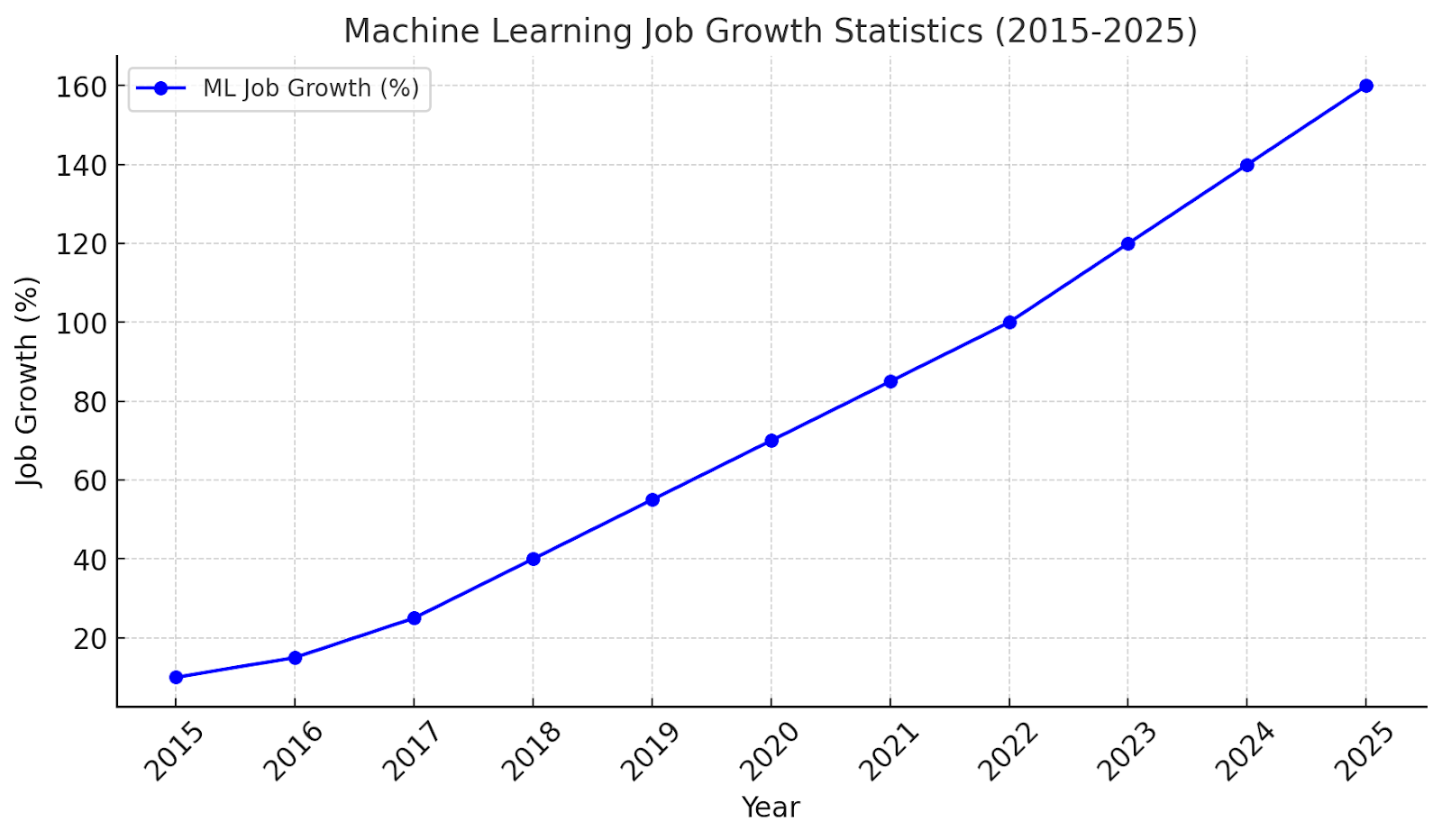
Machine Learning Career Opportunities: Exploring Roles and Growth Prospects
Published: 2025-01-17 10:54:02
In the last decade, machine learning (ML) has transitioned from a niche field within computer science to a key driver of global technological advancements. From AI-powered recommendations on streaming platforms to autonomous vehicles, machine learning is reshaping industries like healthcare, finance, and retail, while creating numerous career opportunities. For tech enthusiasts with a passion for data science, artificial intelligence (AI), and problem-solving, pursuing a Machine Learning career offers immense potential. This article delves into various machine learning job roles, essential skills like Python programming, data analysis, and deep learning, along with the growth prospects in this rapidly evolving field.
Exploring Machine Learning Career Opportunities:
Machine learning offers diverse career paths across industries like healthcare and finance. Essential skills include Python and data analysis. To break in, gain hands-on experience, network, and stay updated on trends.
Understanding Machine Learning
Machine learning is a subset of artificial intelligence (AI) that focuses on developing algorithms capable of learning from and making predictions based on data. Unlike traditional programming, where explicit instructions are written, ML models learn patterns and relationships from data to make informed decisions. Applications span across industries, including healthcare, finance, retail, entertainment, and manufacturing, making machine learning expertise a sought-after skill.

Know About: The Role of Big Data Analytics in Data Science: What You Need to Know
Why Pursue a Machine Learning Career?
The growing reliance on data-driven decision-making across industries has led to an unprecedented demand for machine learning professionals. Here are some compelling reasons to consider a career in this field:
- High Demand and Lucrative Salaries: The demand for machine learning experts consistently outpaces supply, leading to competitive salaries and numerous job openings globally. According to Glassdoor and LinkedIn, ML specialists rank among the top-paying tech professionals.
- Diverse Career Paths: Machine learning offers opportunities across various roles, such as data scientist, ML engineer, research scientist, and AI specialist. Each role contributes uniquely to the development and deployment of intelligent systems.
- Innovation and Impact: Working in machine learning allows professionals to solve complex problems, drive innovation, and contribute to advancements in areas like healthcare diagnostics, climate modeling, and natural language processing (NLP).
- Future-Proof Skills: As technology evolves, machine learning plays a pivotal role in shaping the future. Acquiring ML skills ensures relevance and adaptability in a tech-driven world.
Key Roles in Machine Learning Careers
A Machine Learning career encompasses various roles with distinct responsibilities and skill requirements. Here’s an overview of some prominent positions:
1. Machine Learning Engineer
ML engineers design, build, and deploy machine learning models in production environments. They collaborate closely with data scientists and software engineers to integrate ML solutions into applications.
Responsibilities:
- Building scalable ML systems
- Optimizing model performance
- Automating data preprocessing pipelines
- Collaborating with engineering teams for system integration
Skills Needed:
- Proficiency in Python, R, or Java
- Experience with frameworks like TensorFlow, PyTorch, and Scikit-learn
- Knowledge of distributed computing and cloud platforms
2. Data Scientist
Data scientists analyze large datasets to extract meaningful insights and build predictive models. They combine statistical knowledge with programming skills to address business challenges.
Responsibilities:
- Conducting data exploration and visualization
- Designing and validating machine learning models
- Communicating findings to stakeholders
- Ensuring data integrity and accuracy
Skills Needed:
- Expertise in data manipulation using tools like Pandas and SQL
- Strong foundation in statistics and probability
- Familiarity with machine learning algorithms
3. AI Research Scientist
Research scientists focus on developing novel machine learning algorithms and advancing the field of artificial intelligence. They often work in academia or R&D departments of tech companies.
Responsibilities:
- Researching to solve complex AI problems
- Publishing findings in scientific journals
- Collaborating with interdisciplinary teams
- Designing prototypes and proof-of-concept solutions
Skills Needed:
- Advanced understanding of ML and AI principles
- Proficiency in mathematics, particularly linear algebra and calculus
- Familiarity with academic research methodologies
4. NLP Specialist
Natural Language Processing (NLP) specialists focus on enabling machines to understand and interpret human language. This field powers applications like chatbots, translation systems, and sentiment analysis.
Responsibilities:
- Developing NLP models for text analysis
- Fine-tuning pre-trained language models (e.g., BERT, GPT)
- Evaluating model performance and improving accuracy
Skills Needed:
- Expertise in linguistics and computational linguistics
- Experience with NLP libraries such as SpaCy and NLTK
- Familiarity with deep learning architectures
For detailed information, visit the Wikipedia : Machine Learning
5. Computer Vision Engineer
Computer vision engineers develop systems that enable machines to interpret and process visual data. Applications range from facial recognition to object detection in autonomous vehicles.

Responsibilities:
- Building and training computer vision models
- Implementing image processing techniques
- Optimizing models for real-time deployment
Skills Needed:
- Knowledge of image processing libraries (e.g., OpenCV)
- Familiarity with convolutional neural networks (CNNs)
- Experience with deep learning frameworks
Essential Skills for a Machine Learning Career
To excel in a Machine Learning career, professionals must develop a combination of technical and soft skills. Here are the core competencies:
1. Programming and Software Engineering
- Proficiency in programming languages like Python, R, or Java
- Knowledge of software engineering principles for scalable solutions
2. Mathematics and Statistics
- Strong foundation in linear algebra, calculus, and probability
- Understanding of statistical modeling and hypothesis testing
3. Machine Learning Algorithms
- Familiarity with supervised, unsupervised, and reinforcement learning algorithms
- Ability to choose and implement appropriate models for specific problems
4. Data Handling and Preprocessing
- Experience with data cleaning, feature engineering, and handling missing values
- Proficiency in tools like Pandas, NumPy, and SQL
5. Deep Learning and Neural Networks
- Understanding of architectures like CNNs, RNNs, and transformers
- Experience with frameworks like TensorFlow and PyTorch
6. Cloud Computing and Big Data
- Familiarity with cloud platforms like AWS, Azure, or Google Cloud
- Knowledge of big data technologies like Hadoop and Spark
7. Problem-Solving and Analytical Thinking
- Ability to break down complex problems into manageable tasks
- Strong analytical skills for interpreting data and model outcomes
Read Also: Data Science vs Data Analytics: Understanding the Difference
Industries Leveraging Machine Learning
Machine learning has permeated nearly every industry, unlocking new possibilities and efficiencies. Here are some sectors where ML professionals are in high demand:
1. Healthcare
- Predictive analytics for disease diagnosis
- Drug discovery and personalized medicine
- Medical imaging analysis
2. Finance
- Fraud detection and risk assessment
- Algorithmic trading
- Customer segmentation and credit scoring
3. Retail and E-Commerce
- Personalized product recommendations
- Inventory optimization
- Customer sentiment analysis
4. Automotive
- Development of autonomous vehicles
- Predictive maintenance
- Driver behavior analysis
5. Entertainment and Media
- Content recommendations
- Audience engagement analytics
- Automated video editing
Statistics of Machine Learning Job Demand
Machine Learning (ML) has seen exponential growth in demand over the past decade. With businesses leveraging AI-driven technologies across industries, the need for skilled ML professionals continues to rise. Below are some key statistics highlighting the increasing demand for ML jobs:
Global Job Growth
According to the U.S. Bureau of Labor Statistics (BLS), employment in AI and ML-related occupations is expected to grow 23% from 2022 to 2032, much faster than the average for all occupations.
LinkedIn’s Emerging Jobs Report ranked AI and Machine Learning specialists among the top 5 fastest-growing job roles globally.
Industry Demand
A report by Gartner predicts that AI will create 2.3 million jobs by 2025 while eliminating fewer than 1.8 million, leading to a net positive job creation.
The finance, healthcare, and IT industries have seen a 40% increase in ML-related job postings over the last two years (Indeed, 2023).
Salary Trends
The average salary for a Machine Learning Engineer in the U.S. is $130,000 – $160,000 per year (Glassdoor, 2024).
In India, ML engineers earn an average of ₹10 – ₹25 LPA, depending on experience and location (Naukri, 2024).
Skills in Demand
The most in-demand skills for ML roles include Python, TensorFlow, PyTorch, SQL, NLP, and Deep Learning (LinkedIn, 2024).
60% of job postings now require candidates to have experience with cloud-based ML solutions such as AWS, Azure, or Google Cloud.
Machine Learning Job Growth Statistics Graph
The graph below represents the growth of Machine Learning job postings from 2015 to 2025 (Projected).

Here is the Machine Learning job growth statistics graph (2015-2025). It shows a steady increase in ML job postings over the years, reflecting the rising demand for ML professionals.
Career Growth Prospects in Machine Learning
The career prospects in machine learning are exceptionally bright. As organizations increasingly adopt AI-driven solutions, the demand for skilled professionals continues to grow. Here are some factors contributing to this growth:
1. Technological Advancements
Rapid advancements in computing power, data availability, and algorithmic innovation are driving the adoption of machine learning. Professionals skilled in cutting-edge technologies are well-positioned for leadership roles.
2. Expanding Applications
The range of machine learning applications is expanding daily, creating opportunities in emerging areas like quantum computing, edge AI, and ethical AI.
3. Continuous Learning Opportunities
The dynamic nature of machine learning necessitates lifelong learning. Professionals who stay updated with trends and advancements can access diverse roles and industries.
4. Increasing Adoption Across Industries
Industries such as agriculture, energy, and education are integrating machine learning to optimize processes, enhance productivity, and solve unique challenges.
Challenges and How to Overcome Them
While a Machine Learning career offers immense opportunities, it also presents challenges. Here’s how aspiring professionals can navigate them:
1. Keeping Up with Rapid Changes
- Solution: Regularly attend workshops, webinars, and online courses to stay updated.
2. Bridging the Skills Gap
- Solution: Gain hands-on experience through internships, hackathons, and personal projects.
3. Ethical and Bias Concerns
- Solution: Learn about ethical AI practices and strive to build unbiased models.
4. High Competition
- Solution: Build a strong portfolio showcasing diverse projects and certifications.
Building a Successful Machine Learning Career
To build a thriving career in machine learning, consider these steps:

1. Acquire Foundational Knowledge
- Learn programming languages like Python and R.
- Understand mathematical concepts crucial for ML.
2. Enroll in Specialized Courses
- Take online or offline courses covering machine learning basics, deep learning, and AI.
- Platforms like Coursera, CodeWithTLS, and edX offer excellent resources.
3. Work on Real-World Projects
- Create projects demonstrating practical applications of ML.
- Contribute to open-source initiatives or participate in competitions on platforms like Kaggle.
4. Network with Industry Professionals
- Attend tech meetups, conferences, and webinars.
- Join communities and forums to share knowledge and insights.
5. Pursue Advanced Education or Certifications
- Consider earning a master’s degree in machine learning or data science.
- Obtain certifications like AWS Certified Machine Learning or TensorFlow Developer.
FAQs
- What skills are needed for a Machine Learning career?
Key skills include Python, machine learning algorithms, mathematics, deep learning, and experience with tools like TensorFlow, PyTorch, and Scikit-learn.
- Which industries hire Machine Learning professionals?
Industries such as healthcare, finance, retail, automotive, entertainment, cybersecurity, and manufacturing are actively hiring ML experts to develop AI-driven solutions.
- What does a machine learning engineer do?
A machine learning engineer designs and builds models that enable systems to learn from data, working with algorithms, datasets, and integrating models into production.
- What is the role of an AI/ML engineer?
An AI/ML engineer develops intelligent systems by creating and optimizing AI/ML models for real-world applications.
- How to become a machine learning engineer?
To become a machine learning engineer, earn a degree in computer science or a related field, learn programming (Python, R), master ML frameworks, and gain hands-on experience.
- What is the future demand for Machine Learning professionals?
The demand for ML professionals is rapidly growing, with a projected 38% job growth by 2030, as AI-driven solutions continue to transform industries.
- Is Machine Learning a good career choice in 2025 and beyond?
Yes, with the increasing adoption of AI and automation, ML careers offer high salaries, strong job security, and numerous opportunities in various industries.
- Which programming languages are best for Machine Learning?
The most commonly used languages in ML are Python, R, Java, and Julia, with Python being the industry standard due to its rich ecosystem of ML libraries.
- How long does it take to become proficient in Machine Learning?
The learning timeline depends on prior knowledge, but typically, it takes 6-12 months of consistent learning and practice to develop a solid foundation in ML.
- What are the best online platforms to learn Machine Learning?
Some of the best platforms for learning ML include Coursera, Udacity, edX, Kaggle, DataCamp, and CodeWithTLS, offering courses from beginner to advanced levels.
We hope all your queries about Machine Learning careers, ML jobs, demand, salary, best platforms, and skills needed for ML are completed in this article.🚀
A career in Machine Learning (ML) is more than just a job—it’s a journey of continuous learning, innovation, and problem-solving. As industries increasingly integrate AI-driven solutions, the demand for skilled ML professionals continues to rise. By mastering key skills like Python, deep learning, data science, and algorithm optimization, staying updated with the latest advancements, and building a strong portfolio, individuals can unlock exciting career opportunities.
Whether you're just starting or looking to advance, Machine Learning offers a future-proof, high-paying, and impactful career path. With the right expertise and hands-on experience, you can contribute to cutting-edge technologies that shape the world. 🚀
Read More: Top Skills You Need to Become a Machine Learning Engineer

